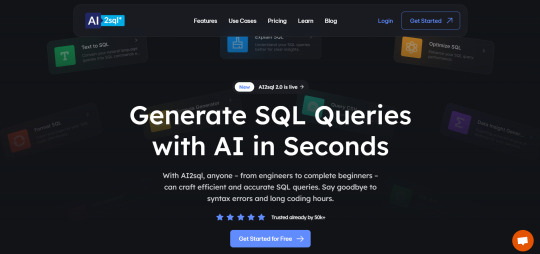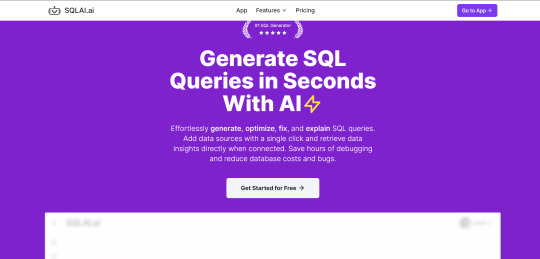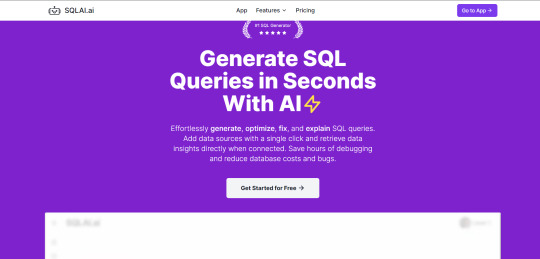#AIinData
Explore tagged Tumblr posts
Text
What If AI Could Fully Manage Your Data Infrastructure?

Imagine a future where AI platforms like Kaif could autonomously manage and optimize all aspects of data infrastructure, from collection to storage and analysis. What impact would this have on business operations?
Scenario:
Envision an AI-driven data infrastructure that automatically collects, organizes, and analyzes data, adjusting storage and processing as needed.
Analysis:
Potential Benefits:
Operational Efficiency: Reduces the need for human intervention in data handling.
Scalability: Easily adapts to business growth and data volume increases.
Proactive Management: AI anticipates and resolves data issues before they arise.
Challenges:
Data Privacy: Ensuring secure handling of sensitive data.
Dependency: Balancing AI efficiency with human oversight to maintain control.
How do you think autonomous data management could change business operations? Would you trust AI to handle critical data processes? Share your thoughts!
Join the discussion on the future of AI in data management and discover how Kaif Platform can enhance your data strategy.
Visit aiwikiweb.com/product/kaif
0 notes
Text
"Data That Delivers: BDaaS Market Growth 2025–2033 📊☁️"
BDaaS Market is reshaping the way businesses process and analyze vast datasets by offering cloud-based solutions. It encompasses data storage, management, and analytics services that eliminate the need for extensive infrastructure, enabling scalable and cost-effective access to advanced data tools. This fosters data-driven decision-making and innovation across diverse industries.
To Request Sample Report: https://www.globalinsightservices.com/request-sample/?id=GIS32185 &utm_source=SnehaPatil&utm_medium=Article
The BDaaS market is expanding rapidly, primarily fueled by the widespread adoption of cloud services. The IT and telecom sector leads the market, leveraging BDaaS to manage large-scale data operations. The BFSI (Banking, Financial Services, and Insurance) sector follows, driven by the growing need for data-driven customer experiences and operational efficiency.
Regionally, North America dominates the BDaaS market due to its advanced IT infrastructure and the presence of major technology players. Europe ranks second, with growing emphasis on digital transformation and stringent regulatory compliance. The United States leads globally, backed by its innovation-driven economy, while Germany shows significant potential with increasing investments in digital technologies.
In 2023, the market reached an estimated volume of 350 million terabytes. Public cloud solutions hold the largest market share at 45%, followed by hybrid cloud at 30% and private cloud at 25%. Key players like IBM, Microsoft Azure, and Amazon Web Services are shaping the competitive landscape with innovative offerings such as AI-integrated analytics and real-time data processing.
While the market faces challenges like data privacy concerns and high implementation costs, it is projected to grow at an annual rate of 15%, driven by rising data generation and the demand for analytics-driven insights. Emerging opportunities in AI-driven analytics and IoT integration promise to redefine the BDaaS landscape, unlocking immense potential for businesses
#BigDataAsAService #BDaaSMarket #CloudComputing #DataAnalytics #DataDrivenDecisions #TechInnovation #DigitalTransformation #AIInData #IoTAnalytics #RealTimeData #ScalableSolutions #BFSIInnovation #PublicCloud #HybridCloud #FutureOfData
0 notes
Text
Could AI Tools Like Ai2sql Replace the Need for SQL Knowledge?

Imagine a future where AI tools like Ai2sql completely handle the process of writing SQL queries. Could this mean that learning SQL is no longer necessary, or is there still value in understanding SQL syntax and database management?
Scenario: Consider a future where business users, analysts, and even developers rely entirely on AI to generate SQL queries. Instead of learning SQL, users simply describe what they need in plain language, and the AI takes care of the rest. This could democratize data access, making it possible for anyone to interact directly with databases without the technical knowledge of SQL.
Analysis:
Potential Benefits:
Increased Accessibility: AI tools like Ai2sql could make data access available to everyone, removing the need for specialized SQL training and allowing more people to gain insights from data.
Efficiency Gains: Users could get the data they need faster without relying on technical teams, leading to quicker decision-making and improved productivity.
Challenges:
Complex Queries: While AI can handle many common queries, complex SQL commands that involve multiple joins, subqueries, or specific optimizations may still require human expertise. Would relying solely on AI limit the complexity of the queries users can create?
Understanding Data Structure: Writing SQL queries helps users understand the structure of the database and the relationships between tables. Without this understanding, could users miss important context when interpreting the data?
Do you think AI tools like Ai2sql could completely replace the need for SQL knowledge, or is there still value in understanding how databases work? Would you prefer to generate queries using natural language or write SQL manually? Share your thoughts!
Join the conversation on the future of data analysis. Could AI be the answer, or will SQL knowledge always be essential? Share your views and explore more at aiwikiweb.com/product/ai2sql/
#AIinData#Ai2sql#SQLAutomation#FutureOfData#DataAnalysis#TechDiscussion#NaturalLanguageProcessing#NoCodeTools#DataAccess#HumanVsAI
0 notes
Text
Tips and Tricks for Making the Most of Ai2sql

Ai2sql is a powerful tool for generating SQL queries, but there are a few ways to make sure you're getting the best results. Here are some tips and tricks to help you use Ai2sql effectively.
Tip 1: Be Specific in Your Prompts
Explanation: The more specific you are in describing your data needs, the more accurate the generated SQL query will be. Include details like date ranges, product categories, or conditions to get precise results.
Tip 2: Review and Customize Generated Queries
Explanation: While Ai2sql provides a great starting point, always review the generated queries and customize them if needed. This ensures the query perfectly fits your requirements and helps you learn more about SQL syntax.
Tip 3: Utilize Query Optimization Features
Explanation: Use Ai2sql's query optimization feature to generate efficient queries that minimize database load and improve performance.
Tip 4: Learn SQL by Analyzing Generated Queries
Explanation: Ai2sql is also a great learning tool. By reviewing the generated SQL code, you can better understand how different commands work, helping you improve your SQL skills over time.
Tip 5: Experiment with Different Databases
Explanation: If you work with multiple databases, try using Ai2sql across different platforms like MySQL, PostgreSQL, or SQL Server. This helps you get a feel for how SQL syntax may vary and how Ai2sql handles different database types.
Use these tips to get the most out of Ai2sql and make your data analysis process smoother. Visit aiwikiweb.com/product/ai2sql/
#Ai2sql#SQLTips#DataTools#NaturalLanguageSQL#DataAnalysis#BusinessIntelligence#SQLAutomation#LearningSQL#DatabaseManagement#AIinData
0 notes
Text
Simplify Your Database Queries with Ai2sql: AI-Driven SQL Query Generator

Ai2sql is an AI-powered tool that makes it easy for developers, data analysts, and business users to create complex SQL queries by simply describing what they need in plain language. The platform converts natural language inputs into optimized SQL code, making data analysis accessible even to those without a deep understanding of SQL syntax. Whether you're managing data for a business or building applications, Ai2sql can save you time and effort in writing SQL queries.
Core Functionality: Ai2sql converts plain language requests into SQL queries, making it easy to interact with databases without needing extensive SQL knowledge. Users can describe their data needs, and Ai2sql will generate the corresponding SQL code.
Key Features:
Natural Language to SQL Conversion: Turn natural language prompts into SQL queries, eliminating the need for manual coding.
Query Optimization: Generate SQL code that is optimized for better performance, saving time and ensuring efficiency.
Cross-Database Compatibility: Works with major databases like MySQL, PostgreSQL, and SQL Server, making it versatile for different projects.
Customizable Outputs: Customize the generated queries to suit specific requirements, giving users more control over the final output.
SQL Learning Support: Learn SQL by reviewing the generated code, helping users understand the structure and syntax of SQL queries.
Benefits:
No SQL Expertise Required: Users can generate complex queries without needing to learn SQL, making data analysis accessible to a wider audience.
Time Efficiency: Save hours of manual coding by generating SQL queries instantly with the help of AI.
Versatile Use Cases: Suitable for developers, business analysts, and anyone who needs to interact with databases, regardless of their SQL expertise.
Ready to simplify your database queries?
Visit aiwikiweb.com/product/ai2sql/
#SQL#Ai2sql#DatabaseManagement#NaturalLanguageProcessing#DataAnalysis#SQLAutomation#AIinData#NoCodeSQL#BusinessIntelligence#DataTools
0 notes
Text
Could Natural Language Replace Traditional SQL Querying?

Imagine a future where all database queries are made using natural language instead of traditional SQL syntax. How would this affect the way we interact with data, and what role would database specialists play?
Main Content:
Scenario: Consider a future where AI tools like Sql AI make it possible for everyone, regardless of technical background, to query databases using natural language. This shift could make data access more democratic, allowing business users, marketers, and other non-technical roles to interact directly with databases without needing SQL expertise.
Analysis:
Potential Benefits:
Increased Accessibility: Natural language querying could make data access available to a broader audience, reducing reliance on technical roles for data retrieval.
Efficiency Gains: Users could obtain the data they need faster, without waiting for a data specialist to write or approve SQL queries.
Challenges:
Complex Queries: Can natural language truly replace SQL for highly complex queries involving multiple joins and subqueries? There may be limitations to what natural language inputs can achieve.
Role of Database Specialists: As more people gain direct access to databases, what would be the role of database administrators and specialists? Would they transition to more strategic roles, focusing on database architecture and optimization?
Do you think natural language querying could fully replace traditional SQL, or is there still a need for SQL expertise in managing complex databases? Share your thoughts!
Join the discussion on the future of database querying. Could tools like Sql AI democratize data access, or will SQL always have a place in data management? Share your views and learn more at aiwikiweb.com/product/sql-ai/
#SQL#NaturalLanguageProcessing#SqlAI#FutureOfData#DataAccessibility#AIinData#TechDiscussion#DatabaseManagement#NoCodeSQL#HumanVsAI
0 notes
Text
Tips and Tricks for Generating Effective Queries with Sql AI

Sql AI makes it easy to generate SQL queries, but to get the best results, it's helpful to know how to use the platform effectively. Here are some tips and tricks to help you make the most out of Sql AI.
Tip 1: Use Specific Language for Precise Queries
Explanation: When using natural language to generate SQL queries, be as specific as possible to ensure accurate results. For example, include details like time frames, product categories, or specific columns.
Tip 2: Take Advantage of Query Optimization
Explanation: Use Sql AI's query optimization feature to improve the performance of your queries. This will help reduce load times and ensure that your database runs efficiently.
Tip 3: Utilize Query Templates for Common Tasks
Explanation: Save time by using Sql AI’s library of query templates. Templates are available for common tasks such as generating sales reports or filtering customer data.
Tip 4: Review and Modify Generated Queries
Explanation: While Sql AI generates SQL queries for you, it’s always a good idea to review and modify the generated query to ensure it meets your specific needs. This also helps you learn more about SQL syntax.
Tip 5: Experiment with Cross-Database Support
Explanation: Sql AI supports multiple databases. Experiment with different databases to see how Sql AI can streamline your workflow across various platforms.
Use these tips to make your database queries more efficient with Sql AI. Visit https://aiwikiweb.com/product/sql-ai/
#SQLTips#SqlAI#DatabaseManagement#AIinData#QueryOptimization#NaturalLanguageProcessing#DataAnalysis#BusinessIntelligence#CrossPlatformSupport#SQLAutomation
0 notes
Text
How Sql AI Empowers Data Analysts to Retrieve Insights Faster

Data analysts often need to write complex SQL queries to retrieve insights from databases, but manually crafting these queries can be time-consuming and prone to errors. Sql AI provides a powerful solution by enabling analysts to generate SQL queries using natural language, simplifying data access.
Problem Statement: Crafting SQL queries requires in-depth knowledge of SQL syntax, which can be challenging for analysts who are not experts in database management. Writing queries manually also increases the risk of errors, leading to delays in retrieving data.
Application: Sql AI allows data analysts to type in natural language requests, such as "show total sales by product for the last quarter," and converts them into optimized SQL queries. This feature makes data retrieval faster and more intuitive, allowing analysts to focus on interpreting the results rather than spending time writing code.
Outcome: By using Sql AI, data analysts can retrieve data insights much more efficiently, reducing the time spent on query creation and minimizing errors. This leads to quicker decision-making and better overall productivity.
Industry Examples:
E-Commerce: Data analysts in e-commerce companies use Sql AI to quickly generate queries that analyze sales trends and customer behavior.
Healthcare: Analysts in healthcare organizations use Sql AI to generate reports on patient data, improving healthcare outcomes through better data analysis.
Finance: Financial analysts use the platform to access transaction data and generate reports on account activity, aiding in fraud detection and financial planning.
Additional Scenarios: Sql AI can also be used by marketers for campaign analysis, HR departments for employee data insights, and small businesses to generate inventory reports.
Discover how Sql AI can help you retrieve insights faster and improve your data analysis workflow. Get started today at https://aiwikiweb.com/product/sql-ai/
#DataAnalysis#SqlAI#AIinData#NaturalLanguageSQL#BusinessIntelligence#SQLQueries#ECommerceAnalytics#DataDrivenDecisions#SQLAutomation#DataInsights
0 notes